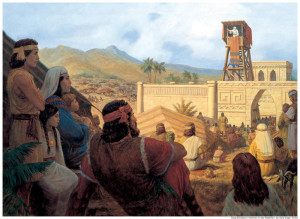The phrase that caught my attention during my “Come, Follow Me” reading was in Mosiah 4:13:
And ye will not have a to injure one another, but to live , and to render to every man according to that which is his due.
King Benjamin makes this comment after his people had just received the baptism of the Holy Ghost and experienced the remission of their sins. They achieved salvation through the steps he’d outlined, which he reiterated. Then King Benjamin said, in verse 12, that if they always retained and remembered that they would
…always rejoice, and be filled with the of God, and always a remission of your sins; and ye shall grow in the of the glory of him that created you, or in the knowledge of that which is just and true.
Be filled with the love of God, retain a remission of sins, grow in the knowledge of glory of God, grow in the knowledge of just and true, have no mind to injure each other, live peaceably, render to every man according to that which is his due.
I’ve kind of glossed over that phrase before, essentially thinking, “Yeah, yeah, be nice, keep promises, do unto others as you would have others do to you.” But every time I went through Mosiah 4 this time, this phrase seemed to want more attention.
So I stopped and thought about what does “render to every man according to that which is his due” mean?
In one sense, the phrase reminded me of judgment. However, the scriptures are clear that the Lord is the judge, not me. So what’s left for me to render? My help? to keep a promise?
The Lord requires a few things of us: to love Him and keep His commandments and love our neighbors as ourselves. So is charity what is due to others?
All Human Beings…Realize Their Divine Destiny as Heirs of Eternal Life
The Family: A Proclamation to the World identifies some things “which is his due.”
ALL HUMAN BEINGS—male and female—are created in the image of God. Each is a beloved spirit son or daughter of heavenly parents, and, as such, each has a divine nature and destiny. ….
IN THE PREMORTAL REALM, spirit sons and daughters knew and worshipped God as their Eternal Father and accepted His plan by which His children could obtain a physical body and gain earthly experience to progress toward perfection and ultimately realize their divine destiny as heirs of eternal life (emphasis added).
During my scripture study, the thought came that this phrase “render…that which is his due” comes after feeling the effects of salvation and living in peace. I closed my eyes to mentally look for scriptural stories that would teach me this principle. These stories were the stories I thought of in the general order they came to mind.
- Mary anointed Jesus’ feet with oil.
- Jesus washed His disciples with water.
- Jesus suffered for the Fall, for sins, for my sins.
- Abraham let Lot decide which land he wanted.
- Joseph Smith welcomed William W. Phelps, “friends at first are friends at last.”
- David preserved King Saul’s life.
- Nephi agreed to be king because his people pled with him to lead them.
- King Benjamin worked for his own support while serving his people.
- Tabitha served women and families in her community.
- Captain Moroni freed captive Lamanites after they make a covenant.
- Jesus healed the leper, paralytic, blind man, those possessed, the woman with the issue.
- Abinadi gave his life so Alma could hear truth.
- Jonah’s preaching saved Ninevah from destruction.
- Amulek received Alma the Younger at great personal cost.
- Abigail pled for David’s mercy for his sake.
- Elisha commanded the Syrian army to be smitten with blindness and then led them safely out of the land.
- The widow gave her mites.
- Naaman’s leprosy was healed.
- Alma and Amulek healed Zeezrom.
- The Shunamite widow’s son rose from the dead.
- Joseph’s brothers bowed before him in Egypt.
- Instead of money, Peter gave healing to the beggar.
- Enos prayed that his brethren and the Lamanites would receive truth.
- Enoch preached repentance to people and they walked with God.
- Abraham paid his tithes and offerings to Melchizedek.
- Paul promised fellow Christians that they were joint-heirs with Christ.
I can see charity, respect, and service with an eye single to God’s glory in those stories.
What “When One Doesn’t Render What Is Due” Looks Like
So how does it look to not render what is due? I mentally searched for examples of those, too.
- Nephi’s brothers tied him to the ship and hoped he’d die.
- Joseph’s brothers sold him into slavery.
- Haman paraded Mordecai through the streets of Shushan while plotting to kill the Jews.
- King Saul tried to kill David multiple times.
- Cain killed Abel.
- Akish killed Jared.
- The daughter of Jared reopened the secret combinations among her people.
- Amalickiah and Ammaron warred against the Nephites.
- Amalickiah rose to the throne through murder and intrigue.
- King Noah’s rule required his people to support his idolatrous lifestyle.
- Jesus’ disciples quarreled over who was greatest in the kingdom of heaven.
- Judas betrayed Jesus for 30 pieces of silver and a kiss.
- Thomas B. Marsh and wife apostatized over milk strippings.
- Simonds Ryder felt offended by name misspelling.
- Coworkers conspired to throw Daniel in a lion’s den.
- Jonah, afraid of the people of Ninevah, fled from the Lord.
- Jesus’ disciples could not cast out demons from a boy.
- A mob stoned Stephen.
While reading these cases of not rendering what is due (from either an eternal or mortal perspective) something C.S. Lewis wrote repeated itself in my mind. It’s the idea that we must see our neighbors as divine beings. What he described became, for me, the ultimate statement of my responsibility to “render to every man according to that which is his due.”
To Render By Seeing Who Everyone Truly Is
It may be possible for each to think too much of his own potential glory hereafter; it is hardly possible for him to think too often or too deeply about that of his neighbor.
The load, or weight, or burden of my neighbor’s glory should be laid daily on my back, a load so heavy that only humility can carry it, and the backs of the proud will be broken.
It is a serious thing to live in a society of possible gods and goddesses, to remember that the dullest and most uninteresting person you talk to may one day be a creature which, if you saw it now, you would be strongly tempted to worship, or else a horror and a corruption such as you now meet, if at all, only in a nightmare.
All day long we are, in some degree, helping each other to one or other of these destinations.
It is in the light of these overwhelming possibilities, it is with the awe and circumspection proper to them, that we should conduct all our dealings with one another, all friendships, all loves, all play, all politics.
There are no ordinary people.
You have never talked to a mere mortal.
Nations, cultures, arts, civilization—these are mortal, and their life is to ours as the life of a gnat.
But it is immortals whom we joke with, work with, marry, snub, and exploit—immortal horrors or everlasting splendors.
This does not mean that we are to be perpetually solemn.
We must play.
But our merriment must be of that kind (and it is, in fact, the merriest kind) which exists between people who have, from the outset, taken each other seriously—no flippancy, no superiority, no presumption.
And our charity must be real and costly love, with deep feeling for the sins in spite of which we love the sinner—no mere tolerance or indulgence which parodies love as flippancy parodies merriment.
Next to the Blessed Sacrament itself, your neighbor is the holiest object presented to your senses.
C.S. Lewis —The Weight of Glory (HarperOne, 2001), pp. 45-46
I’d never considered the implications of this phrase in my life. I probably glossed over it more than any other section of King Benjamin’s amazing speech. I’m so grateful for the opportunity to dive a little deeper into what that phrase could mean and how I can apply it in my life.
I am a member of The Church of Jesus Christ of Latter-day Saints. I have moved 64 times and have not tired of experiencing this beautiful earth! I love the people, languages, histories/anthropologies, & especially religious cultures of the world. My life long passion is the study & searching out of religious symbolism, specifically related to ancient & modern temples. My husband Anthony and I love our bulldog Stig, adventures, traveling, movies, motorcycling, and time with friends and family.










Maybe you hadn’t considered that phrase, but I have seen you live that way day after day! You are kind to strangers and friends. Thank you for these words but even more for your example!!!
You see the best in others. Thanks for your sweet words!!
Thank-you Delisa.
Your thoughts were a major part of our Sacrament service today.
I think of y’all quite regularly. Then I smile.
God bless you.
Your comment made my day!! We sure love and miss y’all!!
I find it amazing how the Lord puts our thoughts on the same page wherever we are in the world. I too was pondering over that same phrase.
Thank you for your inspirational comments.
How wonderful! I love it when I experience that, too. Thanks for your comment.
I was pondering on this phrase- seeking insights when I came upon your blog. Along with C.S. Lewis thoughts, I thought of the talk given by President Eyring where In the act of physically grabbing his boy in exasperation the spirit told him he was holding a great man. Eyring then rendered to his boy that which was his due and respectfully set him back down. Eyring has no more mind to injure his boy in anyway- is this not peaceable? The two ideas are therefore tied together.
Delisa, this phrase also jumped out to me and so I searched to find what that might mean, and I found your inspired comments. Thank you so much. Your comments I believe are true and is how I feel we should look at rendering to another what is due- from the view of charity, the pure love of Christ. I am going to copy this and put in my journal.